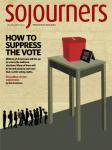OUTSIDE OF BUSINESS circles, accountability is rarely a popular conversation topic. Its implications of deference to authority and limitations on personal freedom are at odds with Western cultural trends. But the controversies that have dogged evangelical pastor Mark Driscoll demonstrate the need for Christians and churches to think more seriously about how authority is understood, exercised, and appropriately checked.
Driscoll, a best-selling author and pastor of Mars Hill Church in Washington state, is known for preaching a “muscular” brand of Christianity and a personal arrogance that fits the part. His views and provocative statements on gender roles, homosexuality, and a variety of other topics have repeatedly sparked debate within evangelicalism, but recent revelations that he pseudonymously posted offensive comments on an online church message board have justifiably brought condemnation from many.
Yet Driscoll’s theology is not the only thing landing him in hot water. A group of more than 20 former Mars Hill pastors have filed a formal grievance with the church based on Driscoll’s leadership style and actions that have been labeled intimidating, controlling, and abusive. Revelations that church funds were spent to buy copies of his book in the hopes of making it a New York Times bestseller and allegations of plagiarism resulted in a formal apology and his publisher pulling books from store shelves. This fall, Driscoll took a multiple-week leave of absence and sought counseling while the church reviewed the complaints against him.
Watching this train wreck has been a source of entertainment and even glee for many Christians; Driscoll is easy to dislike and seems to be getting what’s due to him. But the temptation to self-righteousness and pride afflicts us all. What makes the Driscoll dilemma so captivating is the prominence of his pulpit, the unapologetic nature of his “headship” theology that privileges masculinity over discipleship, and his lack of awareness of the inappropriateness of his behavior.
Yet placing the blame entirely at Driscoll’s feet would be a mistake. While he styles himself a modern-day prophet, he is far more the product of culture and institutional failure than he likely realizes. There is a major systemic reason for this failure: Evangelicalism has long been distrustful of centralized authority and institutions. Instead, it focuses on individual personalities and rallies around charismatic leaders, who often need and seek out acclamation. Driscoll clearly enjoyed the attention his provocations brought him, and many Christians inflated his ego by buying his books, retweeting his opinions, and extolling his virtues.
While some denounced his worst behaviors, nobody with influence or power over Driscoll seemed willing or able to exert authority over him. Now, as Driscoll creatively self-destructs, the religious marketplace will render its judgment—Driscoll appears to have been finally marginalized within the evangelical world, and people are leaving Mars Hill.
Driscoll is far from the first pastor to make an idol out of his own ego. But the lesson here is an old one: faithful discipleship requires humility and obedience. Leadership in ministry is fundamentally about making sacrifices in order to serve others (Mark 10:43-45). Driscoll mistook his personal views for the gospel. He pointed toward a God created in his own image instead of seeing the image of God in everything created.
Accountability is a necessary emphasis in Christian formation and the building of Christian community. By allowing others to lovingly correct our failures in judgment and misguided actions, we protect ourselves from straying from discipleship’s narrow road.
Driscoll deserves the condemnation he’s receiving, but better accountability mechanisms could have saved him and so many others a lot of pain. He follows in a long line of prominent evangelicals who have fallen from grace; these acts of public self-destruction inflict great costs to the body of Christ that could be avoided if accountability within the church received the attention it deserves.

Got something to say about what you're reading? We value your feedback!
